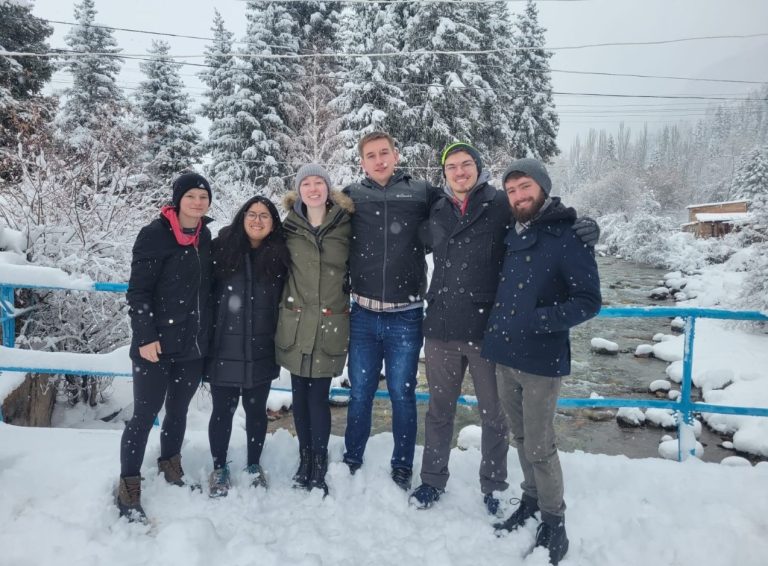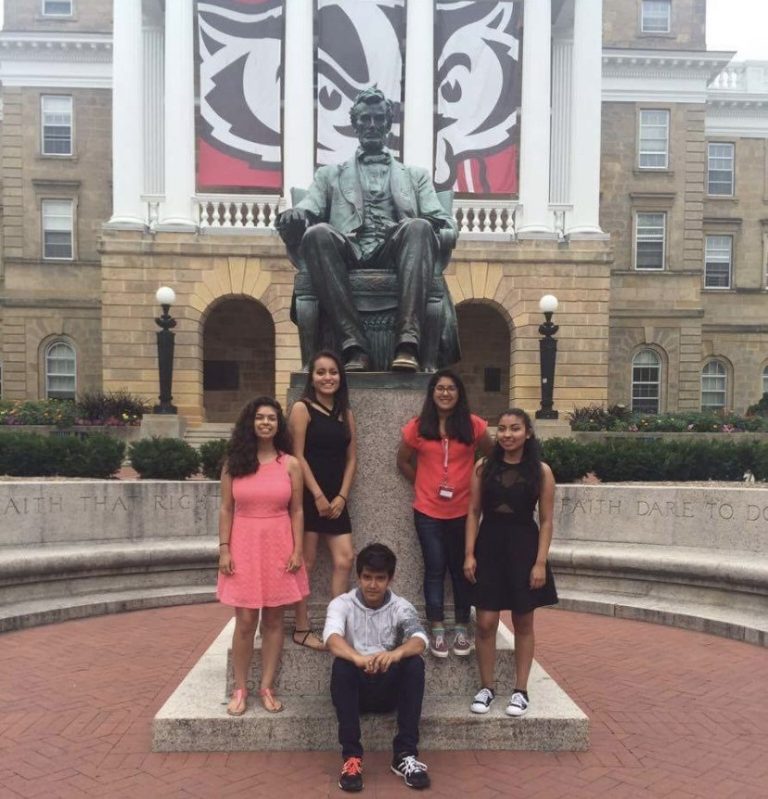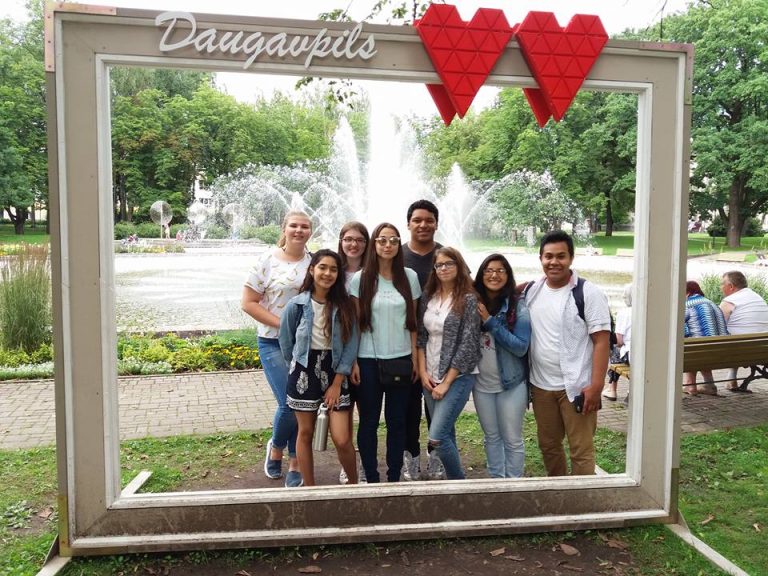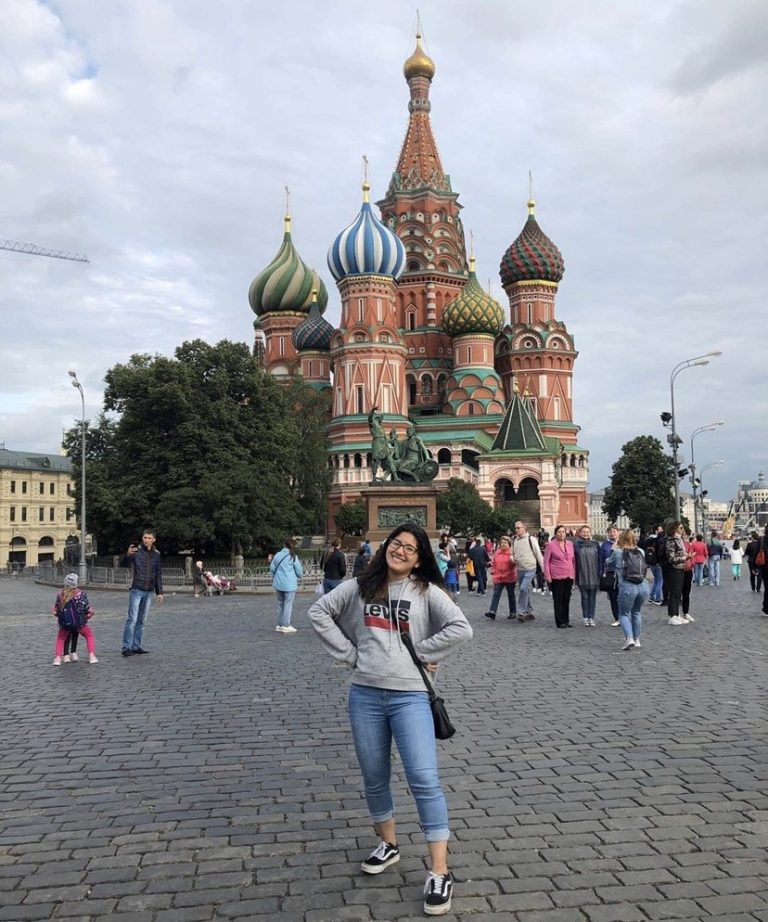Just as UW-Madison senior Claudia Torres Giraldo was wrapping up a year of Russian-language study in Kyrgyzstan this spring to head to Kazakhstan for a Russian-language internship, she received the Post-Secondary Russian Scholar Laureate Award from the American Council of Teachers of Russian (ACTR), a recognition of her excellence in and commitment to Russian-language studies.
Indeed, Torres Giraldo has been on a path toward professional-level proficiency in Russian since high school. And along her multilingual journey, the Peru native has been deepening her understanding of Latinx communities living in Russia and Central Asia during intensive language learning in the region.

This academic year, Torres Giraldo studied at the American University of Central Asia in Bishkek, Kyrgyzstan as part of UW-Madison’s Russian Flagship program—a federal initiative for students of any major to graduate with professional language competence. For this capstone year, the political science major, earning a certificate in Chicanx/Latinx studies, participated in individual tutoring and informal conversation practice, explored city life with a peer partner, and lived with a host family. But she knew well before her plane landed that she would have to actively research where to connect with Latinxs while in Bishkek.
“I searched for hours and found only one Salsa studio related to Latinx culture, but I learned from my instructor that a lot of Cubans actually live here,” she told CREECA in a Zoom interview.
Six years ago at Pritzker College Prep in Chicago, high school junior Torres Giraldo successfully applied to the Pushkin Summer Institute (PSI-Madison), a summer program at UW-Madison for immersive Russian-language study, intercultural exchange, and college readiness.
“It was refreshing to see how much I wanted to learn and make decisions about studying Russian myself,” she said. “Studying [Russian language] was mandatory in high school, but I appreciated that we received this unique opportunity, especially as a person who belongs to the BIPOC community.”

Learning to prepare Russian vinaigrette salad was a particularly formative activity that fueled an interest in Latinxs in Russia.
“It was a wake-up experience because I realized we eat very traditional Russian salads all the time at home and in my hometown, Lima, Peru!” she said. “How does that happen? Russia is so far away. Very interesting and cool.”
Torres Giraldo also discovered an affinity for Russian literature and program namesake Alexander Pushkin, the renowned 19th-century poet dubbed “Russia’s Shakespeare,” whose African heritage was instrumental to his identity and work. Inspired by Pushkin’s legacy and perseverance, the high school senior not only stayed with the language but tested into third-year Russian at Pritzker, mastering level two during PSI-Madison.

That post-program proficiency assessment would not be her last. In summer 2017, Torres Giraldo packed her bags for Daugavpils, Latvia, to live with a host family and study at Learn Russian in the EU for six weeks as a National Security Language Initiative for Youth (NSLI-Y) scholar in the PSI Abroad program implemented by CREECA. As in the Madison PSI, she found no shortage of cultural activities to try in Russian: cooking pelmeni, playing Durak, acting in a play called Репка (‘Turnip’), and relaxing in a Russian banya.
I was there to immerse myself and fit in,” the NSLI-Y scholar said. “I come from a community and neighborhood full of Latinx individuals, so I was self-conscious about my skin color because I looked different to the local people.”
As a college student at UW-Madison, Torres Giraldo found herself two years later in St. Petersburg, participating in American Councils’ Advanced Russian Language and Area Studies Program (RLASP) and purposefully connecting Russian to academic interests and personal identities beyond the classroom. And she discovered a Spanish club and met people from Chile and Ecuador.

“I realized how interested I am in Latinxs in Russia and why they’re moving there,” she said, noting the influence of the 2018 FIFA World Cup, which was held in Russia. “It was big on Peruvian news that people sold their houses to attend the 2018 World Cup in Russia after Peru hadn’t played in 36 years, so it’s very sentimental.”
While traveling Moscow and St. Petersburg, the self-identified literature nerd walked the Crime and Punishment tour, stopped by home museums of famous authors, and explored the Pushkin State Museum of Fine Arts.
“Visiting the Pushkin Museum was particularly emotional because Pushkin’s literature started my journey with Russian language and literature,” she said.
As a Pushkin Scholar, Torres Giraldo is among a select group of PSI alumni with a unique financial aid package to work toward superior Russian-language skills in UW-Madison’s nationally recognized Flagship program.
“PSI students come from minority families, so sometimes options aren’t there,” said the Pushkin Scholar, who worked as a PSI-Madison counselor in 2018. “I was glad to attend the university of my choosing and give back to the community.”
Next, Torres Giraldo departs for Kazakhstan for a two-month, Russian-language internship, a hallmark of the Flagship program and time to reflect on engaging Russian professionally post-graduation. In Almaty, she will gain experience teaching at Кумбель, which stems from her passion for literature and counseling. And she will undoubtedly continue to seek out connections with Latinxs of the Russophone world, a topic she sees herself potentially researching one day in a graduate program.
“I don’t want to forget Russian; it’s important that all my identities in terms of language are part of my future,” she said.
Written by Ryan Goble | Communications Project Assistant | CREECA